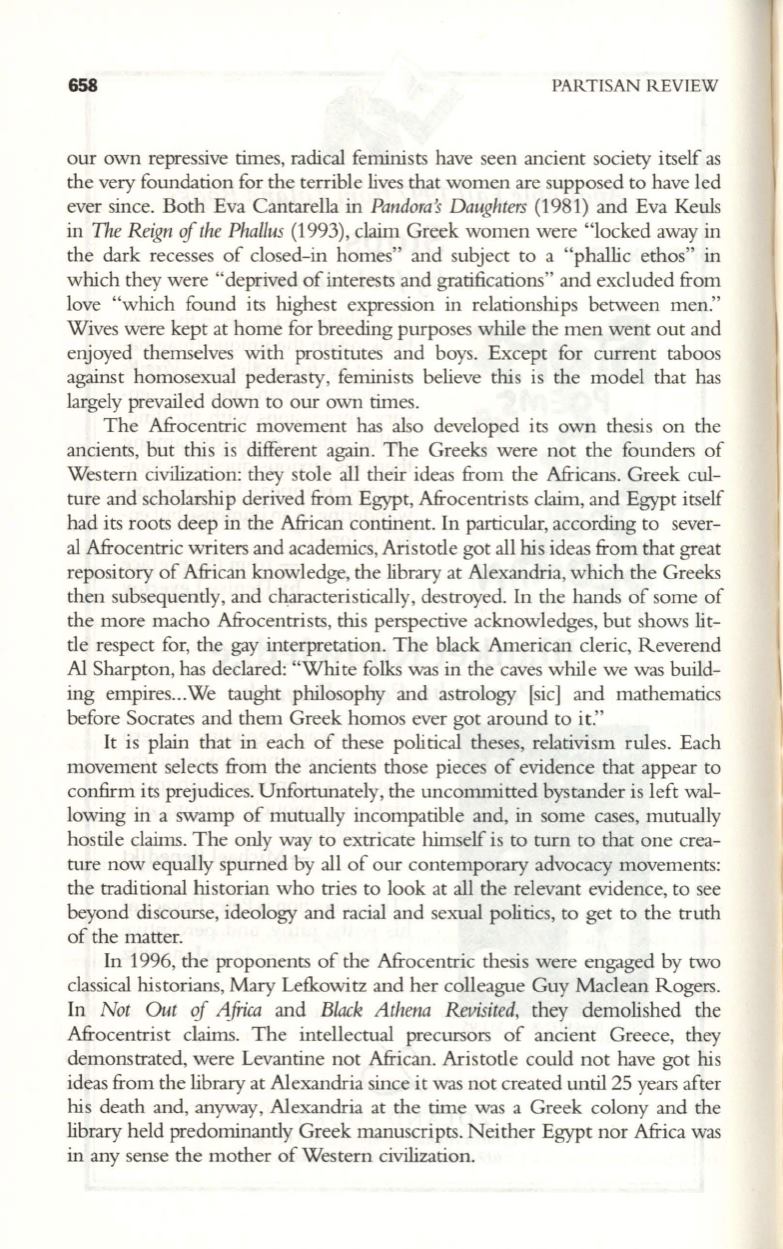
658
PARTISAN REVIEW
our own repressive times, radical feminists have seen ancient society itself as
the very foundation for the terrible lives that women are supposed to have led
ever since. Both Eva Cantarella in
Pandora's Daughters
(1981) and Eva Keuls
in The
Reign
if
the Phallus
(1993), claim Greek women were "locked away in
the dark recesses of closed-in homes" and subject to a "phallic ethos" in
which they were "deprived of interests and gratifications" and excluded from
love "which found its highest expression in relationships between men."
Wives were kept at home for breeding purposes while the men went out and
enjoyed themselves with prostitutes and boys. Except for current taboos
against homosexual pederasty, feminists believe this is the model that has
largely prevailed down to our own times.
The Afrocentric movement has also developed its own thesis on the
ancients, but this is different again. The Greeks were not the founders of
Western civilization: they stole all their ideas from the Africans. Greek cul–
ture and scholarship derived from Egypt, Afrocentrists claim, and Egypt itself
had its roots deep
in
the African continent. In particular, according to sever–
al Afrocentric writers and academics, Aristotle got all his ideas from that great
repository of African knowledge, the library at Alexandria, which the Greeks
then subsequently, and characteristically, destroyed. In the hands of some of
the more macho Afrocentrists, this perspective acknowledges, but shows lit–
tle respect for, the gay interpretation. The black American cleric, Reverend
Al Sharpton, has declared: "White folks was in the caves while we was build–
ing empires...We taught philosophy and astrology [sic] and mathematics
before Socrates and them Greek homos ever got around to it."
It is plain that
in
each of these political theses, relativism rules. Each
movement selects from the ancients those pieces of evidence that appear to
confirm its prejudices. Unfortunately, the uncommitted bystander is left wal–
lowing in a swamp of mutually incompatible and, in some cases, mutually
hostile claims. The only way to extricate himself is to turn to that one crea–
ture now equally spurned by all of our contemporary advocacy movements:
the traditional historian who tries to look at all the relevant evidence, to see
beyond discourse, ideology and racial and sexual politics, to get to the truth
of the matter.
In 1996, the proponents of the Afrocentric thesis were engaged by two
classical historians, Mary Lefkowitz and her colleague Guy Maclean Rogers.
In
Not Out
if
Africa
and
Black Athena Revisited,
they demolished the
Afrocentrist claims. The intellectual precursors of ancient Greece, they
demonstrated, were Levantine not African. Aristotle could not have got his
ideas from the library at Alexandria since it was not created until 25 years after
his death and, anyway, Alexandria at the time was a Greek colony and the
library held predominantly Greek manuscripts. Neither Egypt nor Africa was
in any sense the mother of Western civilization.


